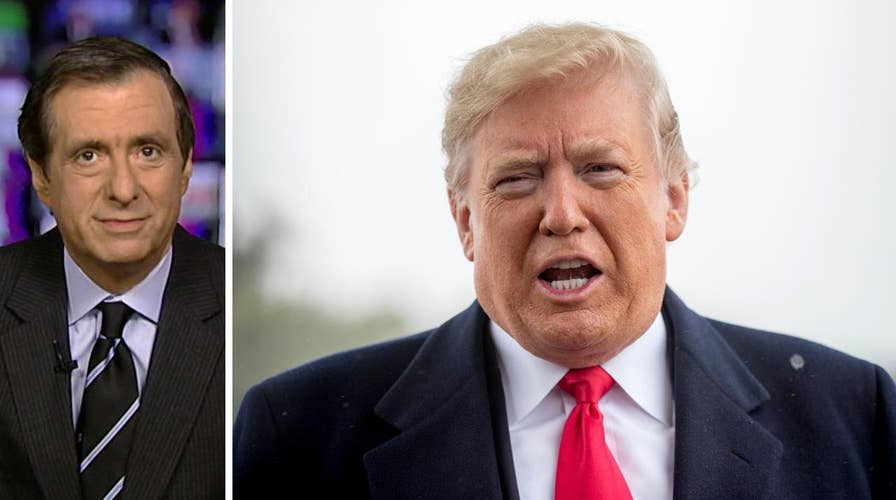Kurtz: President, like Obama, vows executive order on immigration
'MediaBuzz' host Howard Kurtz weighs in on how Trump's birthright citizenship interview is sparking exactly the media reaction he was hoping for.
I'll leave it to the legal scholars to debate the fine points, but it’s no accident that one week before the midterms, President Trump says he wants to revoke birthright citizenship.
Sure, he did it in an interview with Jim VandeHei and Jonathan Swan of Axios for the premiere of the website's string of HBO specials. And yes, Trump expressed surprise that the journalists, who had been digging into the issue, knew about his secret plan to move against the practice.
But the president easily could have deflected the question. Presented with the opportunity, he wanted this out there as a pre-election message.
For Trump to speak of eliminating the practice where illegal immigrants can arrange to have babies in this country, and they automatically become American citizens, is very much part of his eleventh-hour push on immigration. At a time when he has been pounding away at the Central American caravan — at least until that narrative was interrupted by terror attacks — birthright citizenship is shrewdly targeted to his base.
"It was always told to me that you needed a constitutional amendment. Guess what? You don't," Trump told Axios.
When pressed, he said that "you can definitely do it with an Act of Congress. But now they're saying I can do it just with an executive order ... It's ridiculous. It's ridiculous. And it has to end."
The president made this argument: "We're the only country in the world where a person comes in and has a baby, and the baby is essentially a citizen of the United States for 85 years, with all of those benefits."
That is wrong. As the New York Times points out, "dozens of other countries, including Canada, Mexico and many others in the Western Hemisphere, grant automatic birthright citizenship, according to a study by the Center for Immigration Studies, an organization that supports restricting immigration and whose work Mr. Trump's advisers often cite."
There is also the not insignificant matter of the 14th Amendment: "All persons born or naturalized in the United States, and subject to the jurisdiction thereof, are citizens of the United States and of the State wherein they reside."
Some conservatives have argued that the 14th Amendment was intended to apply only to citizens and permanent legal residents.
What's interesting to me is that the right fiercely objected when Barack Obama used his executive power to stop the deportation of the dreamers, saying this was a horrible abuse of presidential authority. They did have a point that Obama was trying to accomplish with a pen what he could not get passed into law, which is why the issue remains unresolved and Trump can threaten to expel younger immigrants unless Congress acts.
But I'm not expecting a whole lot of pushback from conservatives who don't like birthright citizenship. Both parties object to sweeping executive orders when they oppose the policy in question, and justify it as a reasonable exercise of power when a president of their party does it.
One exception is Paul Ryan, who said yesterday in a radio interview: "Well, you obviously cannot do that. You cannot end birthright citizenship with an executive order. We didn't like it when Obama tried changing immigration laws via executive action, and obviously, as conservatives, we believe in the Constitution." Of course, it's easier for the House speaker to object because he'll be gone in January.
You can get the flavor of the mainstream media coverage with this CNN on-screen headline: "TRUMP CLAIMS HE CAN DEFY CONSTITUTION, END U.S. BIRTHRIGHT."
Now I understand why many people find the practice unfair, with many illegal immigrants flocking here on temporary visas or through other means to have their babies in U.S. hospitals. And it's worthy of debate. But the constitutional obstacle means it would probably be tied up in lengthy lawsuits.
That doesn't matter for Trump, at least not right now. The president, who recently complained that the media were so busy covering terror attacks that they were interrupting GOP momentum in the midterms, has his eye on Nov. 6. And by making the over-the-top claim that he can easily do this with the stroke of a pen, he guaranteed the kind of coverage he needs to broadcast the issue to his supporters.
Footnote: Trump used an interview with Fox's Laura Ingraham in part to push back at some critics in the media.
The president responded to the Washington Post headline the day after the Pittsburgh synagogue slaughter, "Critics Say Trump Has Fostered the Toxic Environment for the Political Violence He Denounces."
"I was in the headline of the Washington Post, my name associated with this crazy bomber. 'Trump bomber' or something, but I was in the headline when they got him ... They didn't do that with Bernie Sanders ... They didn't do that with President Obama with the church, the horrible situation with the church" in South Carolina, he said.
Ingraham also asked him about GQ correspondent Julia Ioffe, who first blamed Trump for the Pittsburgh massacre and then said on CNN that he had "radicalized so many more people than ISIS ever did."
Trump said Ioffe "must be some kind of sick woman."
I still can't believe that Ioffe, who has also worked for the Atlantic and Politico, said that. But she said she was sorry later in Jake Tapper's show, and repeated that on Twitter:
"I clarified and apologized on air, but I'll say it again here. This has been a very emotional and painful time, but I absolutely should not have gone with such hyperbole on the air. I apologize."











































